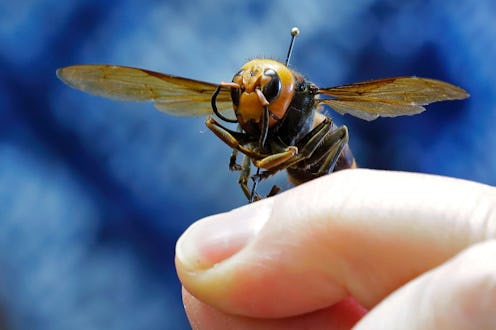Life
Experts Explain What Your Murder Hornet Nightmares Mean

When things are stressful in the outside world, that tends to manifest as nightmares (which seems pretty unfair if you ask me). One particularly disturbing nightmare people are reporting during the coronavirus pandemic? Dreams about bugs.
"Nightmares are often — but not always — a conglomeration of the information we have taken in over the past days, the memories we have related to them, and manifestations of our interpretation of that information," Josh Klapow Ph.D., a clinical psychologist, tells Bustle. "Our news cycles are dominated by illness, COVID, secondary illnesses associated with COVID, restrictions, quarantines, financial hardship, and lots of uncertainty," Klapow says. Ergo, bad dreams.
A study by Associazione Italiana di Medicina del Sonno in Italy, one of the countries most affected by coronavirus, is looking at peoples' dreams during the pandemic, and the researchers told National Geographic that many people are reporting nightmares and night terrors. Bugs feature heavily: "The biggest dream cluster is bugs; flying bugs attacking the dreamer, cockroaches swarming, masses of squirming worms," Deirdre Barrett Ph.D., a sleep expert who has studied dreams following natural disasters, told The Guardian in April.
Klapow says that if you're dreaming of bugs right now, it's likely a combination of stress and current events. "With the recent news of the invasion of Asian giant hornets, it's understandable that [bug-related] nightmares are occurring," he says. (Fortunately the arrival of Asian giant hornets in the U.S. isn't a big deal right now, in case it's been weighing on your mind.) But bug dreams may also be dealing with the experience of the coronavirus in another way. "The images of the COVID-19 virus have a bug-like quality, which may also trigger these kinds of nightmares," Klapow says.
Some people view nightmares as a way for people's brains to process extreme emotions and deal with crises. "Bugs in nightmares can represent plagues, death, evil, and negativity," Dr. Seema Sarin M.D., director of lifestyle medicine at EHE Health, tells Bustle. "This could correlate with how a person is processing and perceiving the COVID-19 crisis."
Nightmares in general might be more common at the moment. Klapow says that people are on different sleep-wake cycles, eating at different times of day, and generally experiencing higher levels of stress and anxiety, all of which can contribute to scary dreams. "If you are having nightmares, this may be a good opportunity to reflect on your current feelings and emotional state," Dr. Sarin says. If you're having a lot of nightmares or waking up afraid, it's worth talking to your doctor or a sleep specialist about how to manage your fear and anxiety while awake.
Experts:
Josh Klapow Ph.D., clinical psychologist
Dr. Seema Sarin M.D., director of lifestyle medicine, EHE Health
This article was originally published on